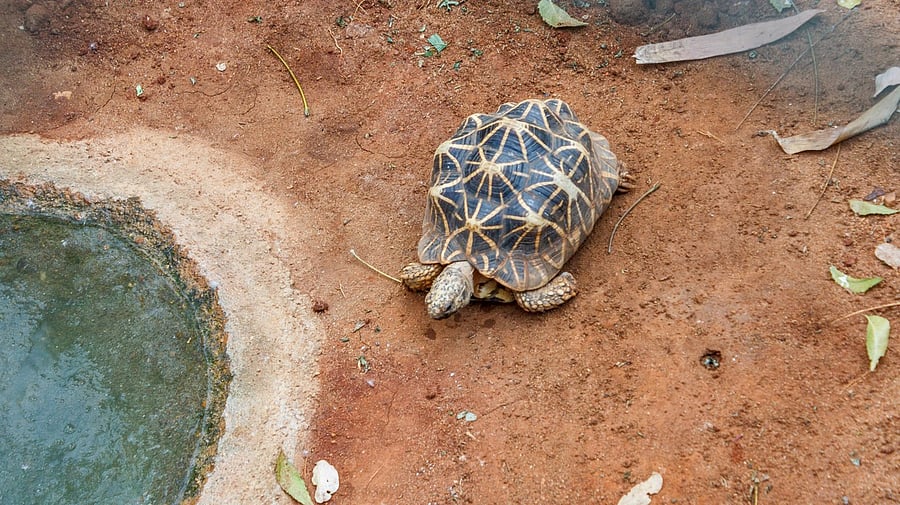
Image showing a star tortoise. For representational purposes.
Credit: iStock Photo
Chandrapur: A total of 340 Indian star tortoises have been released into their natural habitat in Rajura reserve forest in Maharashtra's Chandrapur district as part of an ambitious rehabilitation project, officials said on Saturday.
It marks a major step in the Turtle Rehabilitation Project (TRP), a collaborative effort between the Maharashtra Forest Department and RESQ Charitable Trust to address the growing issue of turtles and tortoises being rescued from illegal wildlife trade and captivity, they added.
"It is one of the largest organized releases of this species in the state. It follows an intensive rehabilitation process that began in late 2024. With this release, the reserve forest of Chandrapur has emerged as home for Indian star tortoises rescued from illegal wildlife trade. Over the past few months, 441 Indian Star Tortoises were admitted to the programme, many in severely compromised health," an official said.
"With a survival rate of approximately 80 per cent, the current cohort ready for release has successfully completed all stages of medical care, quarantine, and environmental acclimatization. A final group continues to undergo rehabilitation and is expected to be considered for release in due course," he added.
The rehabilitation programme at the Wildlife Transit Treatment Centre in Bavdhan in Pune was designed to replicate natural living conditions and prepare the animals for life in the wild, the official said, adding the various phases involved stabilisation, medical treatment, and quarantine in observation and treatment enclosures, followed by gradual transition to semi-natural outdoor rehabilitation habitats.
"The animals were then placed on species-specific foraging diets, with a strong focus on native grasses and seasonal vegetation to rebuild gut health and encourage natural feeding behaviours. Special attention was given to UV exposure and thermoregulation through strategically designed basking zones and shaded resting areas," the official said.
The progress was closely tracked through periodic biometric assessments such as weight, shell quality, and hydration levels alongside regular behavioural observations of feeding, mobility, and social interactions, he said.
"The tortoises undertook a 900-kilometre journey from Pune to Chandrapur district, where they have been released in the Reserve Forests of Central Chanda that are known for natural occurrence of the species and habitat suitability. Previous smaller releases in this area have yielded promising results, with forest staff reporting frequent sightings, evidence of breeding and juvenile individuals, which are clear indicators of successful reintegration," he said.
APCCF Dr Clement Ben said the move reflects a growing commitment in Maharashtra to tackle the issue of illegal wildlife trafficking not just through enforcement, but through long-term, sustainable rehabilitation and release programmes that return animals to where they belong.
Chandrapur Chief Conservator of Forests Jitendra Ramgaonkar said each release has provided forest department personnel valuable insights into the adaptability and resilience of the species when reintroduced into their native habitat, which have helped strengthen local populations and contributed to restoring ecological balance in the region.
"For the upcoming batches, we are working on innovative tagging solutions that will enable us to monitor the post-release movement and behaviour of the tortoises more effectively. This will allow us to gather critical data to inform future conservation strategies while ensuring the welfare of the animals remains uncompromised," Ramgaonkar said.